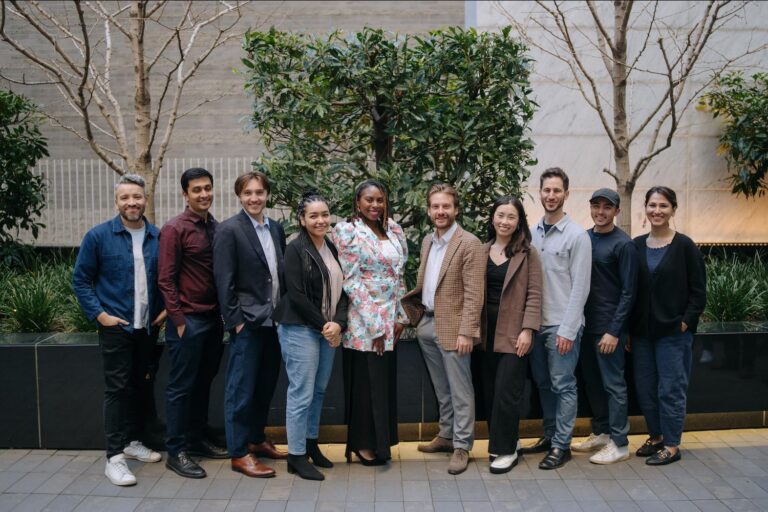Founders of artificial intelligence startups in the latest cohort of Fast Forward’s accelerator program. (Image courtesy of Fast Forward)
As we live in a time of unprecedented technological advancement, the possibilities for leveraging technology for the benefit of humanity have never been greater. At the forefront of this effort is Fast Forward, an organization focused on scaling startups that combine technology with sustainable nonprofit business models.
Fast Forward is focused on using artificial intelligence (AI) to build solutions to global challenges under its AI for Humanity initiative. “We felt that outside of early tech nonprofits like Wikipedia, Khan Academy, and Mozilla, there weren’t enough examples of people using technology to make the world a better place,” said Kevin Barenblat, co-founder of Fast Forward. “So our vision for the AI for Humanity initiative is to support entrepreneurs who are building and using AI to make the world a better place.”
This vision aligns with growing global conversations around AI, including its role in achieving the UN’s Sustainable Development Goals and as a key component of the 2024 Force for Good technology report.
Founded over a decade ago, Fast Forward has backed over 100 technology startups and has become a prominent presence in the “tech for good” space through its startup accelerator program, which just completed its 11th cohort, with 12 startups participating in this round, two-thirds of which are leveraging the power of AI to address issues such as poverty, health inequity, education gaps, and environmental injustice.
AI startups in this cohort are helping scientists in low-income countries treat neglected diseases, reducing case backlogs in Indian courts to ensure fair and speedy trials, bridging the global digital divide by moving online learning offline, addressing early childhood education gaps in India, and providing free virtual mental health interventions to those in need.
Additionally, Barenblatt estimates that roughly a quarter of the 100 startups Fast Forward has worked with are currently actively working with AI. “Newer organizations are more likely to have AI at the core of what they do,” he says. “Some of them have a more traditional technology model and are now embracing AI. Or some of them have used older forms of AI, like machine learning, and are now building more modern generative AI tools.”
One of the most obvious and powerful uses of AI is managing vast amounts of data, Barenblatt said. One example is RebootRX, a startup that aims to fast-track affordable cancer treatments using repurposed generic drugs, AI technology and innovative financing models.
“There’s a ton of research out there, and humans can’t read it all,” Barenblatt says, “so RebootRX uses AI to read the articles, papers and research studies, identify the most promising drug candidates and then try to find funders who will fund further research and clinical trials of those drugs.”
RebootRX has raised at least $1 million to date and is part of Fast Forward’s 2020 accelerator cohort.
But as AI evolves, so do the ethical considerations surrounding its deployment. Barenblatt acknowledged that AI, like any tool, can be used in different ways. “For me, AI is like the world inventing a new kind of wrench,” he said. “It’s not just a question of the tool, it’s also a question of the impact it has.”
But nonprofit entrepreneurs are typically focused on solving social problems and using AI ethically and responsibly, Barenblatt says. “In the for-profit world, you often see people building these cool tools and trying to figure out what problem it solves,” he says. “But in the nonprofit space, entrepreneurs are typically fixated on a problem — education, health disparities, climate issues — and they incorporate AI to improve the solution. Because they’re using AI for a specific use case, they can set appropriate guardrails for how they use AI.”
Despite being a transformative technology, AI nonprofits face all the challenges that other tech startups and nonprofits face. “Tech startup challenges include getting the product-market fit right, competing for resources and funding, and focusing on marginalized customers that aren’t typically easily accessible,” he says. “I think AI can help, but at the end of the day, they’re still trying to help humans.”
Over the years, Fast Forward has received backing from leading technology companies, including OpenAI, Google and Salesforce, which provide funding and technical expertise. “Typically, it’s investors and philanthropists who make the first impact. [that support the organization]”Some of it is very AI-focused, but most of it is paper-focused. We’re very interested in things like climate change, education and health, and it just so happens that we now have the tools to achieve that kind of impact at a much smaller cost,” Barenblatt said.
The philanthropic effort aligns with Fast Forward’s efforts to shape a future in which AI enhances human capabilities, rather than replacing them, Barenblatt said.
“The story of AI hasn’t been written yet. It’s being written by us,” he said. “AI gives us this unique opportunity to write the future. I don’t think AI will actually solve problems like health, education, climate, inequality, etc., but it gives humans the opportunity to do so. I do this work because I feel like we have a choice to make, and it’s up to us to decide if we want to use AI in this way.”


